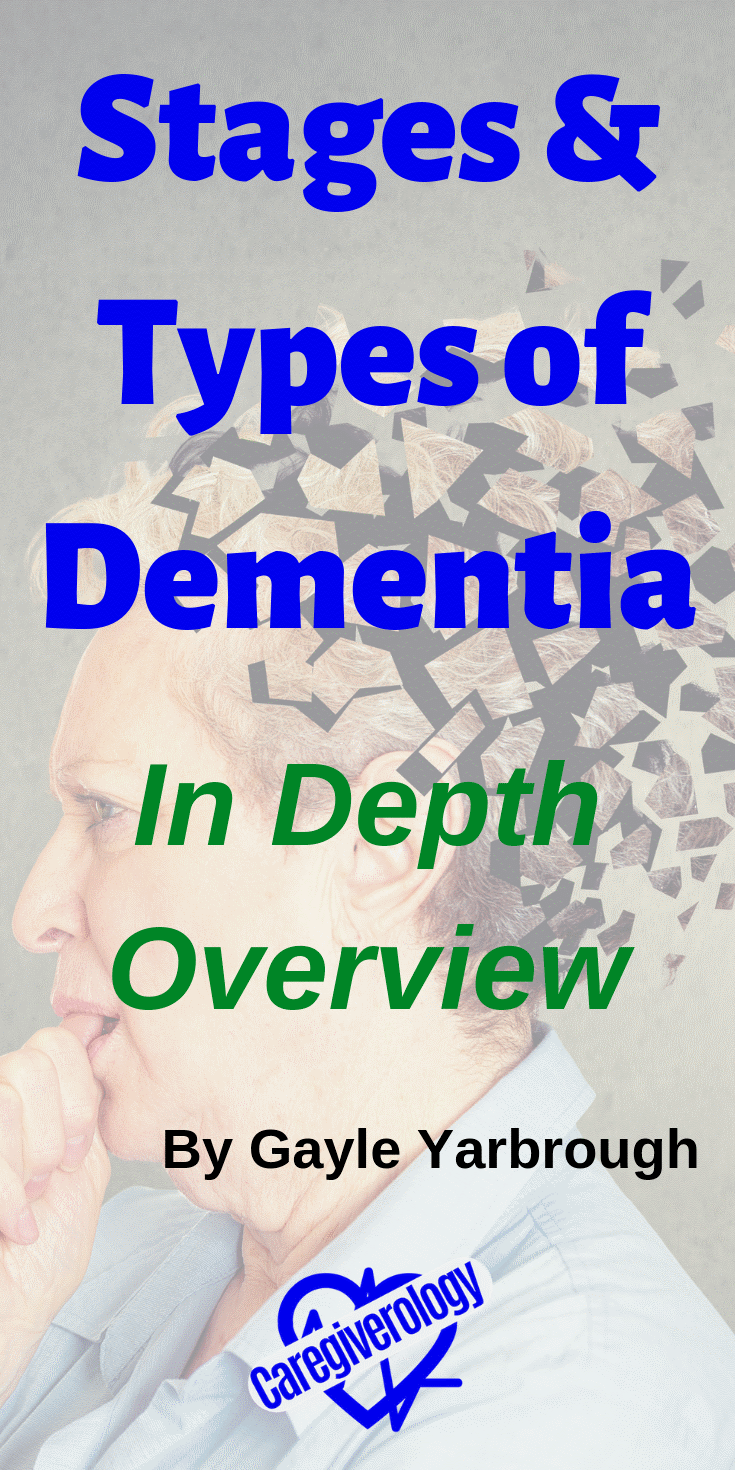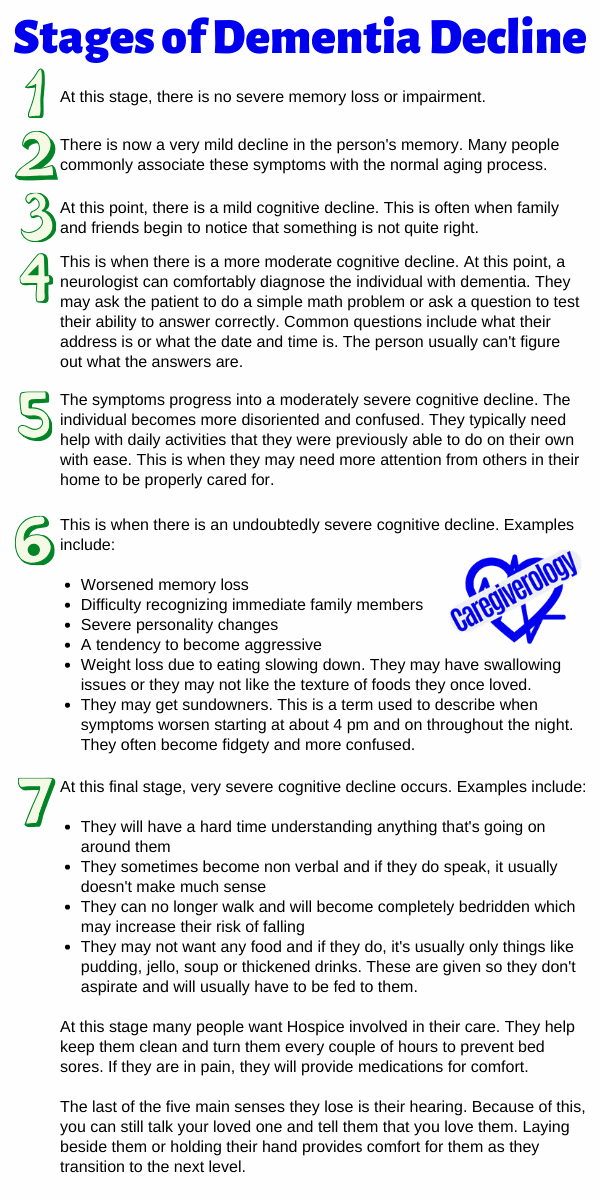Stages and Types of Dementia: In Depth Overview
Many people are unaware or uninformed about the various stages and types of dementia. The amount of different types may surprise you. This is because dementia is an umbrella term used to describe several different types of cognitive decline. Alzheimer's disease is the most common and widely known.
Stages Decline Types Final thoughts
Dementia Progresses Into These Three Separate Stages
These three stages are categorized by the symptoms the person with dementia experiences. They are used to help people better understand the severity of the current state of the disease, as well as the what to expect as time passes and the symptoms progress.
Early (Mild) Stage
It begins, of course, in the early (mild) stage. The individual may start to realize something is wrong. They may try to hide their symptoms from others. The actual symptoms may very, depending on the area of the brain being effected. It may include memory loss, behavioral changes, or both. Some common examples include things like forgetting names, misplacing keys, or driving to work on a Saturday.
Middle (Moderate) Stage
The next step would be the middle (moderate) stage. This is the stage where people who are close to the individual usually start to notice the changes. Examples of common symptoms include unusual frustration, anger, mood swings, conflicts with others, uncooperative behaviors, and suspicion of others.
Late (Severe) Stage
In the late (severe) stage, there is extensive damage to the brain. The individual becomes solely dependent on others for all activities of daily living (ADL). More specifically, their mobility decreases, they sleep most of the time, their ability to talk and find the right words diminishes, and their overall health worsens, which makes them extremely fragile.
The Seven Stages of Decline
The Seven Stage Model of dementia breaks down the Cognitive decline. Most doctors use this model to rate dementia. The progression can vary a lot depending on the type of dementia and the person in general. Understanding these stages can help us know the kind of care that will be needed as the disease progresses.
Click here for a poster of these stages
Stage One
At this stage, there is no severe memory loss or impairment.
Stage Two
There is now a very mild decline in the person's memory. Many people commonly associate these symptoms with the normal aging process.
Stage Three
At this point, there is a mild cognitive decline. This is often when family and friends begin to notice that something is not quite right.
Stage Four
This is when there is a more moderate cognitive decline. At this point, a neurologist can comfortably diagnose the individual with dementia. They may ask the patient to do a simple math problem or ask a question to test their ability to answer correctly. Common questions include what their address is or what the date and time is. The person usually can't figure out what the answers are.
Stage Five
The symptoms progress into a moderately severe cognitive decline. The individual becomes more disoriented and confused. They typically need help with daily activities that they were previously able to do on their own with ease. This is when they may need more attention from others in their home to be properly cared for.
Stage Six
This is when there is an undoubtedly severe cognitive decline. Examples include:
- Worsened memory loss
- Difficulty recognizing immediate family members
- Severe personality changes
- A tendency to become aggressive
- Weight loss due to eating slowing down. They may have swallowing issues or they may not like the texture of foods they once loved.
- They may get sundowners. This is a term used to describe when symptoms worsen starting at about 4 pm and on throughout the night. They often become fidgety and more confused.
Stage Seven
At this final stage, very severe cognitive decline occurs. Examples include:
- They will have a hard time understanding anything that's going on around them
- They sometimes become non verbal and if they do speak, it usually doesn't make much sense
- They can no longer walk and will become completely bedridden which may increase their risk of falling
- They may not want any food and if they do, it's usually only things like pudding, jello, soup or thickened drinks. These are given so they don't aspirate and will usually have to be fed to them.
At this stage many people want Hospice involved in their care. They help keep them clean and turn them every couple of hours to prevent bed sores. If they are in pain, they will provide medications for comfort.
The last of the five main senses they lose is their hearing. Because of this, you can still talk your loved one and tell them that you love them. Laying beside them or holding their hand provides comfort for them as they transition to the next level.
Different Types of Dementia
These terms describe the root cause and the various symptoms associated with the specific type of the disease.
Alzheimer's Vascular LBD FTD Mixed CJD NPH HD
Alzheimer's Disease
This occurs when the individual's brain cells and their connections degenerate and die. This type of dementia is the most common form with 60 to 80% of the cases. Symptoms include:
- Not being able to recall recent conversations
- Unable to recall the name of a familiar object
- Not remembering someone visiting them
- Showing poor judgement
While these symptoms are not uncommon as someone ages, they become more concerning when they begin occurring much more frequently.
Alzheimer's is not reversible...it is degenerative and incurable at this point in time. No blood test, brain scan, or physical exam can definitively diagnose the disease. Because there are so many conditions that can produce symptoms resembling it, reaching this conclusion is complicated. Sometimes it is just an educated guess until an autopsy of the brain after death confirms the diagnosis. The life expectancy after being diagnosed is about 8 to 12 years.
Vascular Dementia
This occurs when the individual has brain damage caused by multiple strokes. The early stages of this disease slightly resembles Alzheimer's.
Instead of the primary signs of memory loss, the symptoms show more in the area of planning, decision making, and following steps. Oftentimes there is just an overall slower speed of thought and focusing. There is usually an increase of anxiety, depression, and mood swings. Physical symptoms may occur such as worsened speech, a decrease in vision, and increased weakness in limbs.
Lewy Body Dementia (LBD)
This occurs when lewy bodies, which is are abnormal deposits of a protein called alpha-synuclein, increase in certain areas of the brain. The symptoms can also look like Alzheimer's in its early stage, but there are key differences.
When they are in the early stage, their attention can vary from day to day and even moment to moment. They may have visual hallucinations that they can describe to you in great detail. Parkinson's type motor skills are also seen in these individuals such as tremors, slowness, and stiffness.
Frontotemporal Dementia (FTD)
Pick's disease is another term that is often used. This is caused by degeneration of the frontal, temporal, or both lobes of the brain. One of the symptoms include semantic dementia (SD) which affects the ability to remember names and understand language.
It doesn't show memory or cognitive symptoms in the early stage. Instead, it shows more behavioral and emotional issues. The individual becomes very selfish and apathetic. Over eating may also become a problem. They may act inappropriately in social places such as impulsive acts and a lack of manners.
Mixed Dementia
This describes a combination of two or more types. Forty five percent of those with dementia have signs of both Alzheimer's and Vascular dementia.
Creutzfeldt-Jakob Disease (CJD)
This is an extremely rare cause of dementia. Less than one in a million people with dementia are diagnosed per year. It occurs when prion, which is natural protein found in the brain, becomes toxic to brain cells.
The symptoms are the same as other types of dementia but the person has muscle stiffness and twitching. It progresses much faster and usually the person dies within a year of being diagnosed.
Normal Pressure Hydrocephalus (NPH)
This is another rare cause of dementia. Only about five percent of people with dementia are diagnosed with this and they are usually over 65 years old. It is caused by excess fluid build up in the brain's ventricles which causes damage to the brain. Symptoms include forgetfulness, difficulty walking, loss of bladder control, and memory loss.
Huntington's Disease (HD)
This disease often leads to dementia It is caused by a defective gene which causes the brain's nerve cells to break down early. Symptoms often include difficulty thinking and reasoning as well as an inability to learn new things. The impairment often causes swallowing to become more difficult.
Final Thoughts and Comments
The best approach to handling any stage and type of dementia is proper education, communication, engagement, support and loving care. Learn everything you can, seek support groups, and set up a care plan. Get your loved ones affairs In order. Seek an elder attorney and have your loved one appoint a power of attorney.
Do you know someone who has any of these symptoms? Have they been diagnosed with dementia? What stage and type? Do you know of any other examples of symptoms to look out for? Let me know in the comments down below.
Thank you Gayle Yarbrough for contributing this article.
Dementia Caregiver Info, Help, and Tips
Late Stage Alzheimer's Disease Care Tips
Do Medications help Dementia Symptoms?
Guest Articles Written for Caregiverology
Medical References and Resources for Caregivers
From Stages and Types of Dementia: In Depth Overview to Home
Recent Articles
-
Common Truck Crash Injuries and Legal Remedies - Caregiverology
Jul 19, 25 10:49 AM
Known for its sun-drenched beaches, vibrant arts scene, and bustling maritime industry, Fort Lauderdale is a city that sees heavy traffic both on its roads and at its busy port. Unfortunately, with th… -
Why Expert Legal Help Matters After Serious Injury - Caregiverology
Jul 19, 25 10:35 AM
In Houston, over 67,600 car crashes occurred in 2023, resulting in 290 fatalities and 1,612 serious injuries. That’s roughly 185 accidents every day. -
How Life Care Planners Support Injury Recovery - Caregiverology
Jul 19, 25 10:18 AM
In Los Angeles, life care planners play a vital role in supporting injury recovery, especially for individuals facing catastrophic injuries such as traumatic brain injuries or spinal cord damage.






New! Comments
Have something to say about what you just read? Leave a comment in the box below.